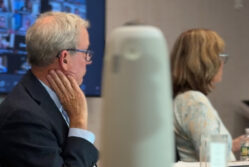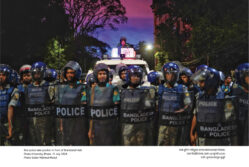Event Coverage Highlight

Edward Wong Discusses His Family’s Saga from China to US in ‘At the Edge of Empire’
by Chad Bouchard
Edward Wong, a diplomatic correspondent for The New York Times, shared photos and stories about his father’s past life in China that he seldom spoke about, during an OPC event on Dec. 10. Wong’s father’s story started in post-World War II China, wending through his service in the Chinese Army and flight during the Cultural Revolution, ultimately landing in Washington, DC.
The book night, co-sponsored by the Asian American Journalists Association, explored Wong’s new memoir, At the Edge of Empire: A Family’s Reckoning with China.
Tracy Jan, a deputy health and science editor at The Washington Post, moderated the discussion. Wong was the OPC Foundation’s David R. Schweisberg Scholarship winner in 1998. Jan and Won met in 1999 when Jan was in Taiwan on a Fullbright fellowship, and the two later reconnected as neighbors in Washington, DC.
Wong discussed his research in China, the process of interviewing his father, and talked about contemporary topics such as the potential for war between the U.S. and China over Taiwan, his advice for aspiring correspondents, and answered questions from the audience on a range of topics.
He said his father, now in his early 90s, wasn’t reluctant to talk about his experiences when asked, but “I had to take the initiative to pry it out of him.”
“I think he realized that there was value in some ways in sharing the history with me and in the fact that I would share it with the outside world,” Wong said. “When a lot of people are that age, they think that the events that they lived through – there is some sense that lessons can be learned, and a sense of the importance of that history, which could be lost if it’s not documented in some way.”
Wong’s drive to pursue a career in journalism started when, after graduating from college, he traveled for a few months across the Middle East and Mediterranean Europe. He decided he wanted “to be able to do exactly what I done on that trip which is just talk to lots of people find out interesting stories and then later on tell them to the world.”
Wong landed his first job reporting on the Potomac River area of Maryland for a weekly paper owned by The Washington Post, and then traveled to China to study Chinese in Beijing, and then attended graduate school at the University of California/Berkeley. After reporting on the 1997 handover of Hong Kong for the Los Angeles Times and other outlets, he got an internship at The New York Times and reported on several desks as a junior reporter. Following the 9-11 attacks in 2001, he volunteered to report on Iraq for the Times and ended up staying there for three and a half years, later moving to China and serving as correspondent for nearly 9 years.
“When news happens, you want to jump on it. You want to have this instinct of wanting to be in the middle of it, in my opinion. There are some reporters who don’t feel the need for that, their beats don’t really call for that,” he said. “But I think if you’re reporting as a foreign correspondent or on international news you need to have this hunger to be in the middle of events, even very traumatic events.”
Wong said he doesn’t believe the U.S. is necessarily destined to go to war with China over Taiwan, but China’s increasing aggression from the sea and air over the last few years, as well as digital intrusions and spreading disinformation, have heightened tensions.
“It’s a question of whether [China] thinks that the costs [of a full-on invasion] are worth it. It’s a question whether they think that’s the best way to try and bring Taiwan under communist rule. It might not be the best way,” he said. “And it’s a question of their national power relative to the national power of America and other countries that might be opposed to them, including Japan, Korea, European allies of the U.S.”


